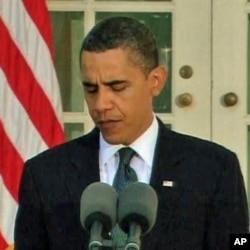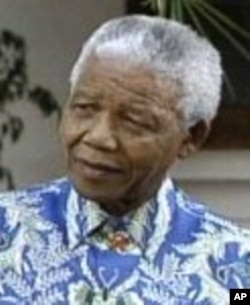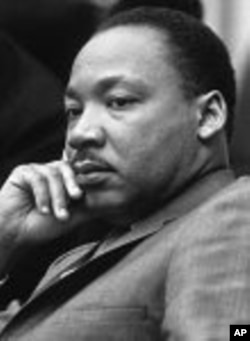As President Barack Obama accepts the 2009 Nobel Peace Prize Thursday in Oslo, Norway, the U.S. leader is set to stake the popularity and admiration he has won overseas during his first 11 months in office to urge others to improve living standards and tackle the inequities and challenges of the future.
Some critics note the irony of Mr. Obama’s receiving the award less than a week after authorizing 30,000 more U.S. troops to shore up the war effort in Afghanistan. But Howard University constitutional law professor Lisa Crooms considers him more than a wartime president.
Crooms chairs the steering committee of the Campaign for a New Domestic Human Rights Agenda. She says she is hopeful that the Nobel opportunity will allow the president’s inspirational skills and prestige as a promoter of human rights across borders to translate into domestic gains for citizens in their own countries and for minorities within the U.S. as well.
“My hope is that he’ll use the opportunity to put in place the types of mechanisms that are necessary to ensure that people’s human rights are in fact protected as a matter of not just international law, but domestic law and policy,” she said.
While playing down his own accomplishments and qualifications to win the Nobel prize in less than a year as president, Mr. Obama did stand up to Kenya’s president and prime minister as a U.S. senator and presidential candidate in 2008 to urge an end to Kenya’s post-election violence. Lisa Crooms says he deserves credit for this, but in the long run, his role as a peacekeeper has just begun to unfold.
“As he has admitted, this award is more about his potential rather than what he has accomplished thus far. The hope is that he will reclaim his audacity and armed with his Nobel Peace Prize, do his best to fully realize that potential rather than have it thwarted,” she said.
Professor Crooms says it is premature to see President Obama as a transformational figure on the international scene, but hopefully, like several previous illustrious Nobel honorees, including the Reverend Martin Luther King, Jr., and former South African President Nelson Mandela, President Obama will be able to combine his predecessors’ commitment to fighting for international rights with what she calls Reverend King’s inward looking passion.
Described by his Nobel nominator as a figure of hope, Mr. Obama, according to Crooms, will develop the ability to translate international progress in human rights into enduring safeguards for impoverished, disadvantaged citizens inside countries, who have been denied opportunities for health care, education and jobs because of discriminatory practices. For Mr. Obama’s role as a broker of peace, she cites the example of another African-American Nobel prize winner, United Nations mediator Ralph Bunche
“All he has to do, I mean, the places he can look beyond the laureates mentioned would be Ralph Bunche. And in many respects, championing the kind of brokering of peace that he was rewarded for by the very same committee in 1950, I think. It’s Bunche, King, and Obama that come to mind in that in many respects, Bunche’s outward focus in terms of human rights as a matter of international law, and King’s inward focus, particularly later on in his life, close to his death, that Obama in fact represents at least the potential for the merging of those two things,” she pointed out.
The Campaign for a New Domestic Human Rights Agenda advocates a strong bipartisan commitment to human rights that sets high standards for the way those guarantees are also secured for citizens at home. The group urges U.S. leaders to adhere strictly to international treaty obligations regarding the treatment of war criminals, an outlawing of discriminatory practices, and a judicious application of civil rights laws.
The group also wants President Obama to transform the bipartisan U.S. Commission on Civil Rights into a nonpartisan Commission on Civil and Human Rights and seeks U.S. accountability and understanding of the human rights implications of American treaty obligations as they apply to domestic law.




